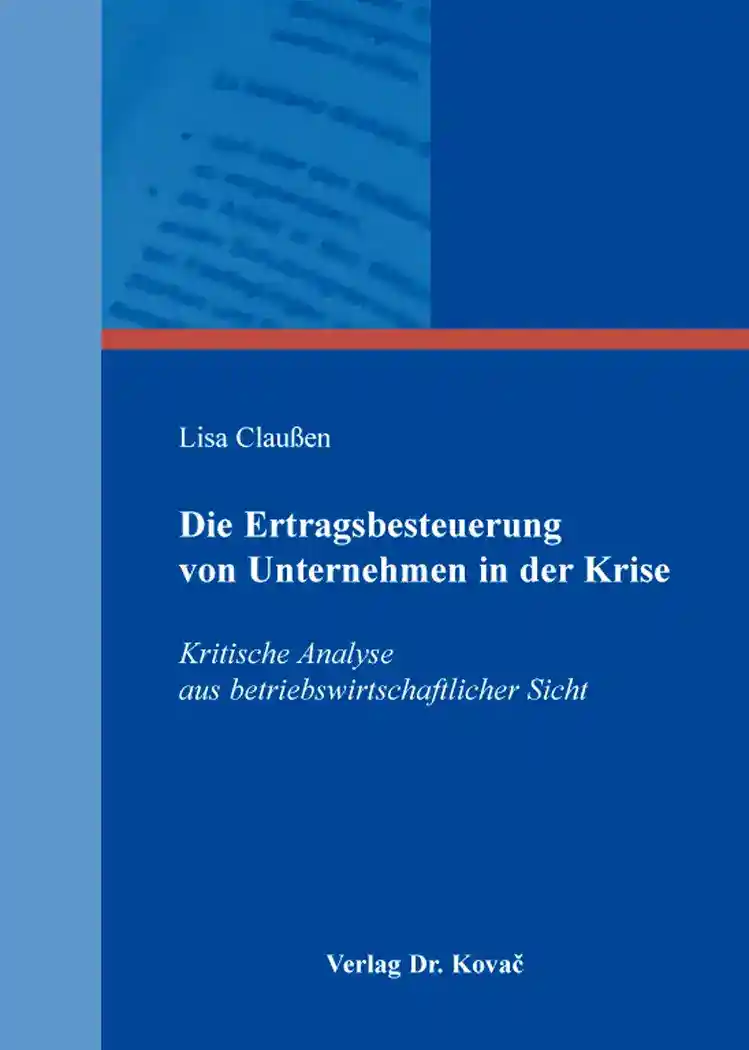Lisa ClaußenDie Ertragsbesteuerung von Unternehmen in der Krise
Kritische Analyse aus betriebswirtschaftlicher Sicht
Betriebswirtschaftliche Steuerlehre in Forschung und Praxis, volume 103
Hamburg 2015, 460 pages
ISBN 978-3-8300-8608-6 (print) |ISBN 978-3-339-08608-2 (eBook)
About this book deutschenglish
The taxation of companies‘ earnings in Germany is criticized for causing an aggravation of an existing financial crisis and for the possible prohibition of restructuring and recapitalization of the company. Although this fundamental problem has been known for many years and despite many changes in the legislative basis of taxation, the basic critique arose repeatedly against the background of any macroeconomic crisis in past decades. Hence the legislator has not succeeded in developing and implementing a conclusive concept of business taxation during a financial crisis. While German bankruptcy law has already been reformed to a great extent to eliminate barriers of restructuring, business tax law indicates the opposite development: The abolishment of tax-free recapitalization gains (formerly regulated in para. 3 no. 66 EStG) can actually result in due tax payments during a financial crisis causing an instant threat to existence. The implementation of a general minimum taxation (para. 10d II EStG) regardless of previous losses leads to a taxation of unrealized gains and therefore brings at least temporarily a taxation of assets instead of revenue. This development climaxed in the so called „Unternehmensteuerreform 2008“ (reform of company taxation 2008) with numerous rulings to implement an asset-based rather than a revenue-based taxation: implementation of the „Zinsschranke“ in para. 4h EStG / 8a KStG (an interest deduction ceiling), intensification of the loss carry over limitation in case of a change of control (para. 8c KStG) as well as the extension of the non-deductable expenses in the context of the „Gewerbesteuer“ (trade tax) in para. 8 no. 1 GewStG. For a start the book aims at identifying relevant tax regulations and analysing their impact on the room to maneuver of companies in a financial crisis. This includes tax regulations on transfer or liquidation of the company as an alternative way to cease the financial crisis of the company. Finally there will be a concrete proposal for reform derived from current deficits which meets the demands of taxation according to performance and consistent with German bankruptcy law and European Community Law.Keywords
BesteuerungBetriebswirtschaftliche SteuerlehreErtragsteuernInsolvenzKriseLiquidationMindestbesteuerungSanierungSanierungsgewinnSanierungsmaßnahmenUnternehmensübertragungVerlustuntergangZinsschrankeIhr Werk im Verlag Dr. Kovač

Möchten Sie Ihre wissenschaftliche Arbeit publizieren? Erfahren Sie mehr über unsere günstigen Konditionen und unseren Service für Autorinnen und Autoren.
